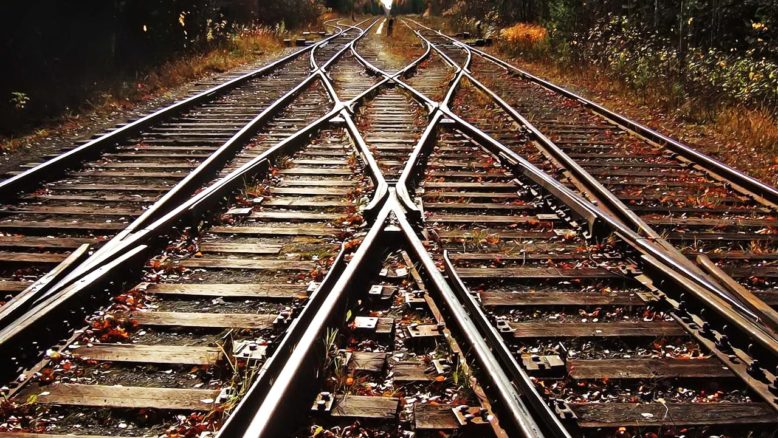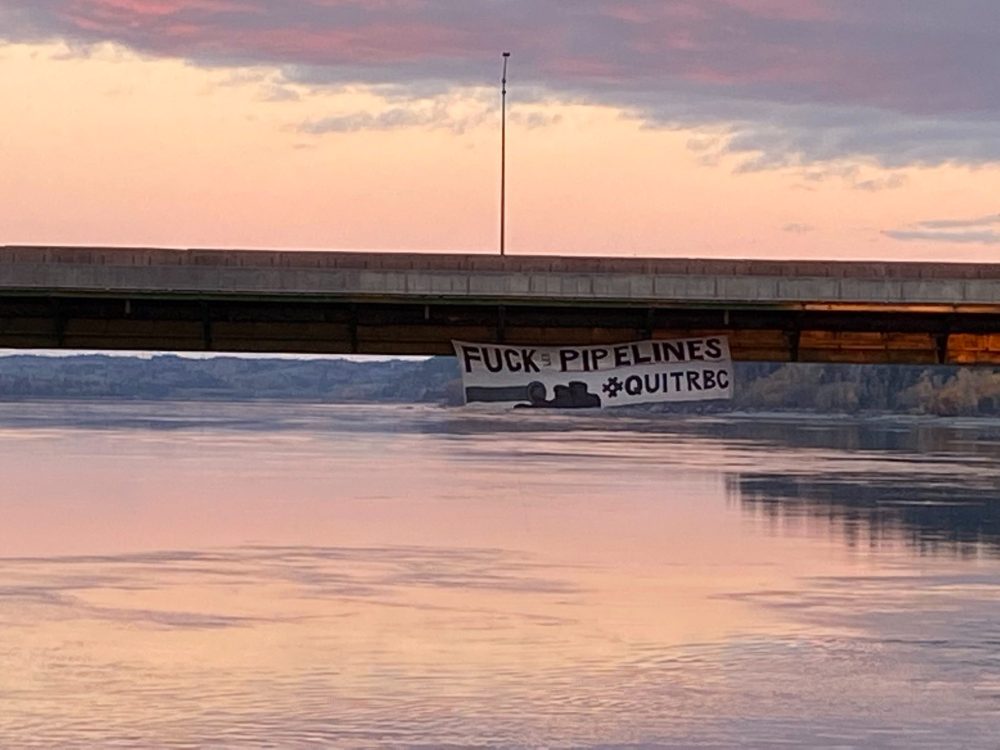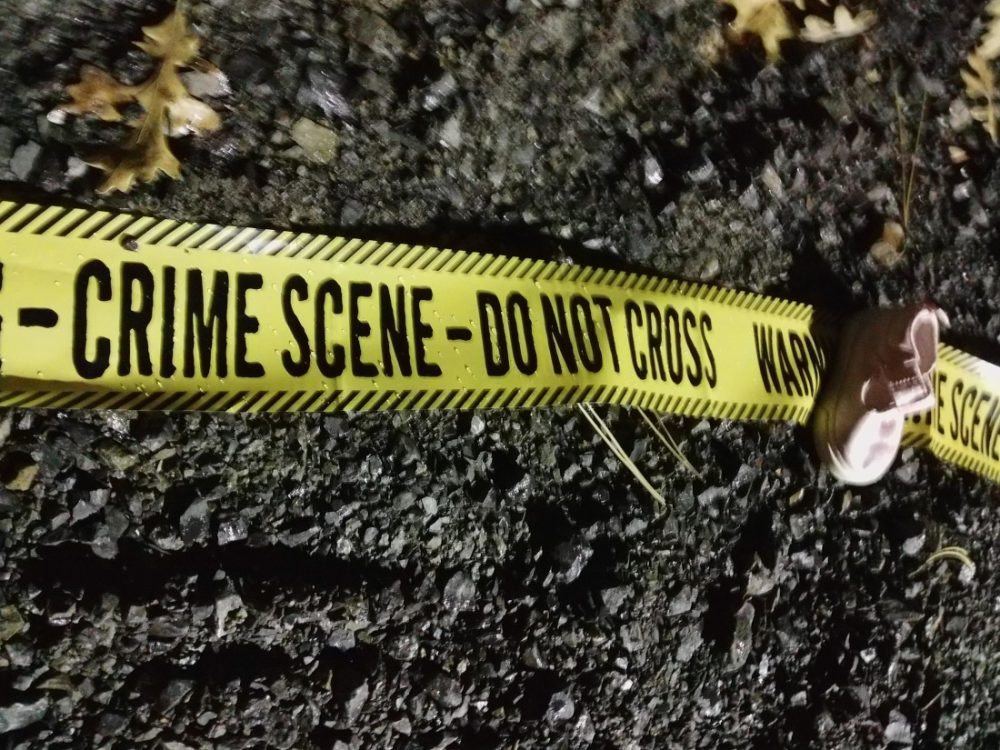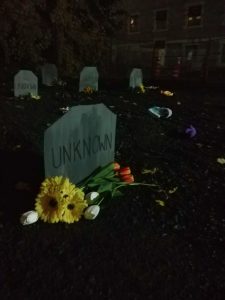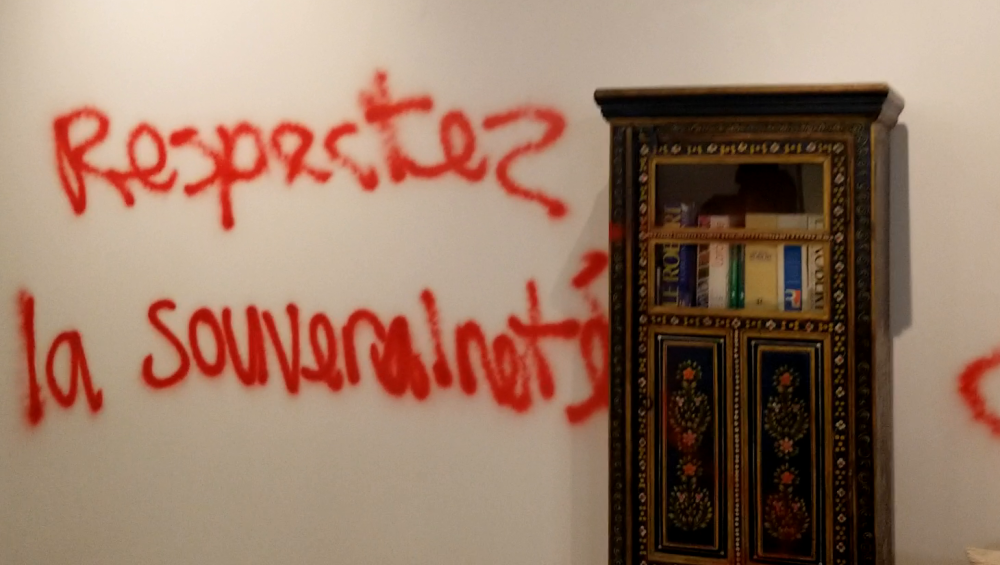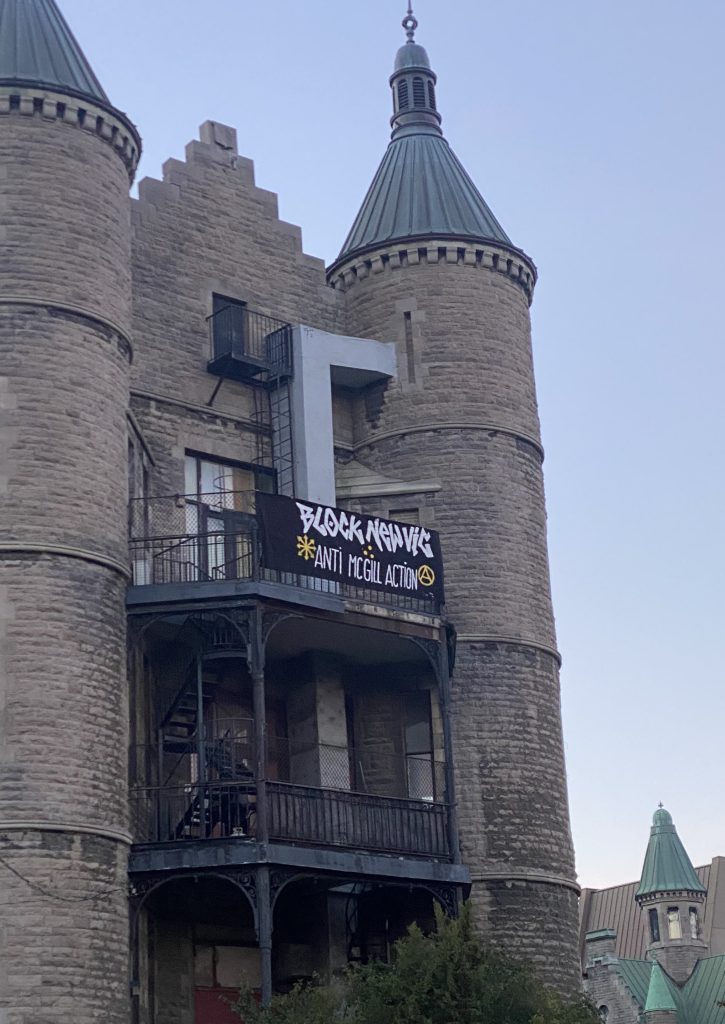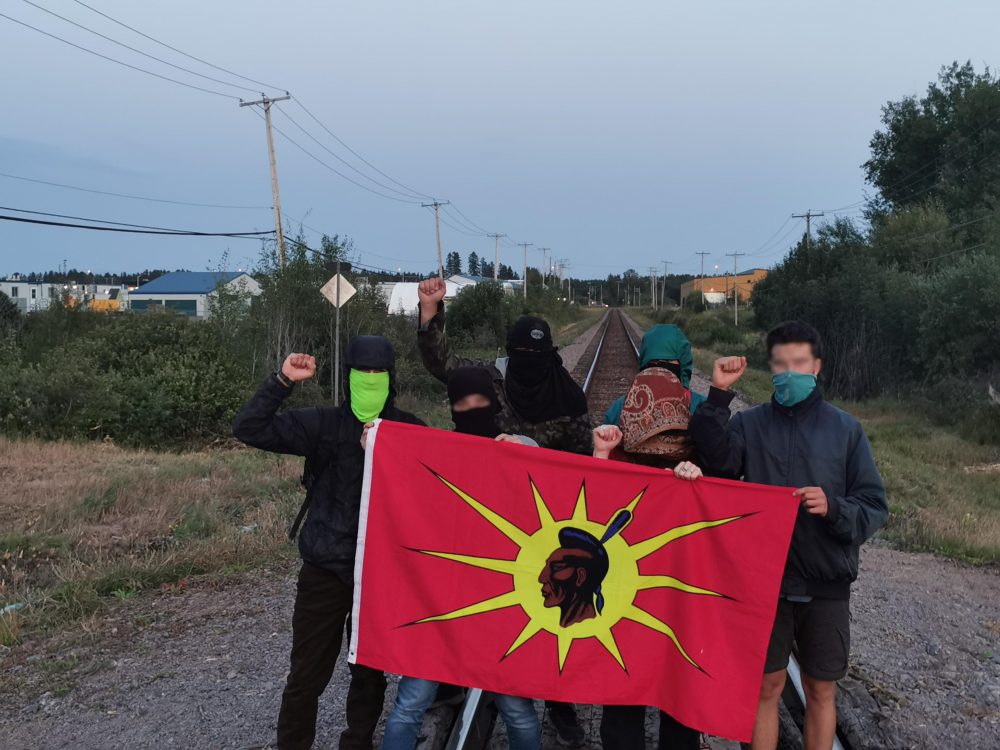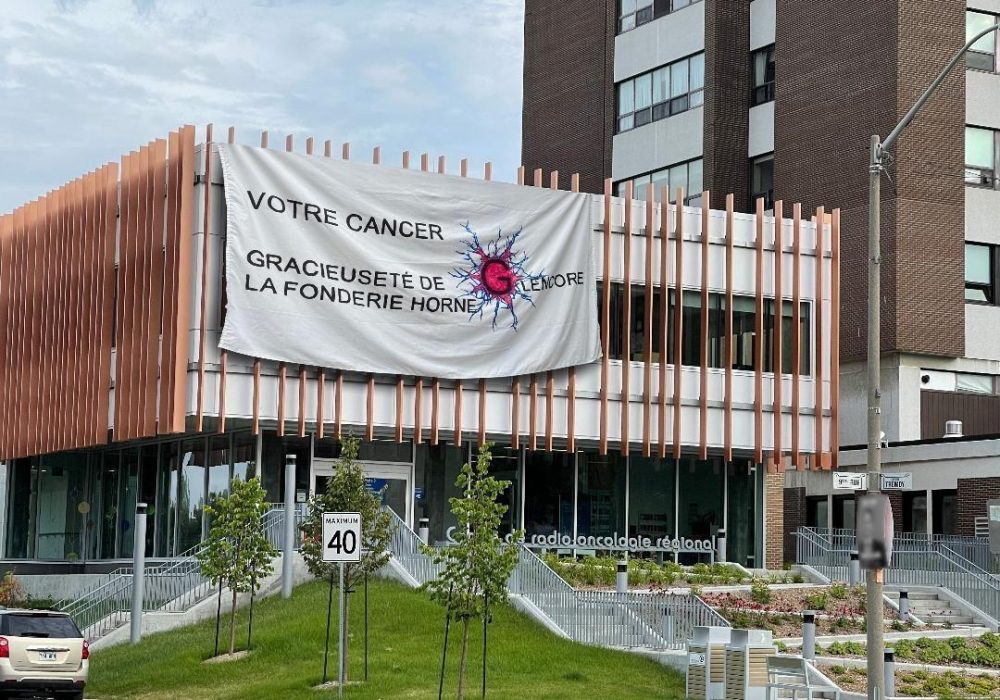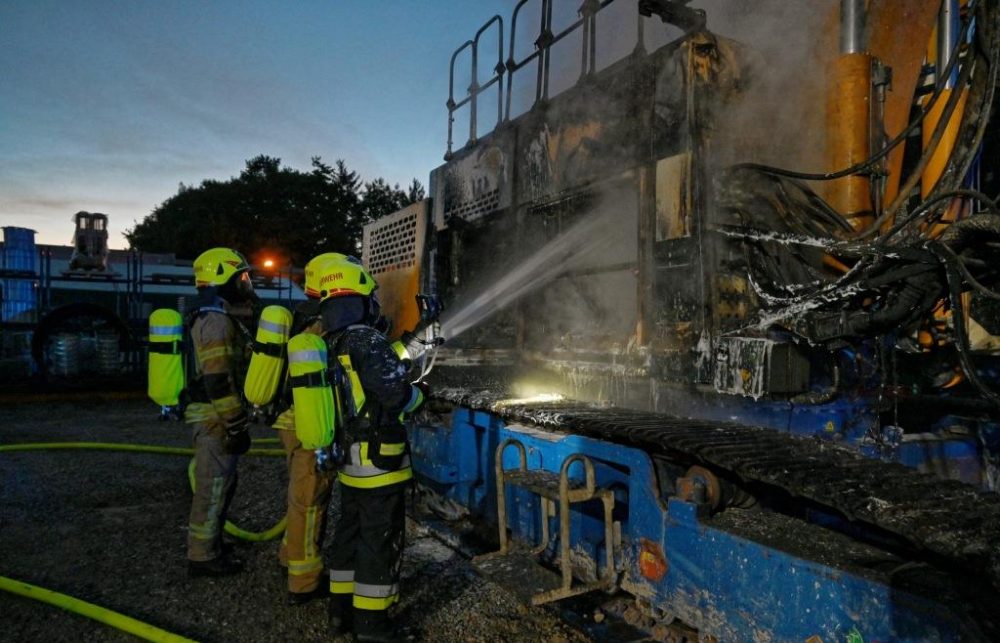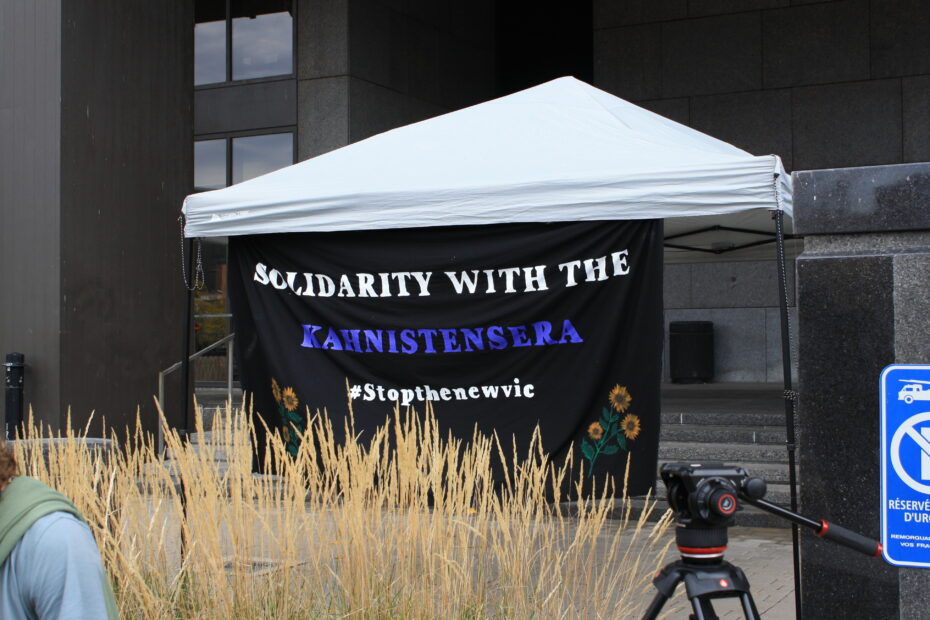
Anonymous submission to MTL Counter-info
Through this solidarity struggle, it has become clear that as a radical community, we need to stand in solidarity with the kanien’kehá:ka kahnistensera.
Because these traditionalist activists from Kahnawa:ke have been fighting for the last fifty years for the sovereignty of their people.
Because they are among the few Mohawk people who still hold fast to their pre-colonial mode of governance, called the Great Law of Peace.
Because this code organizes the Haudenausaunee confederacy as what we would interpret as libertarian federalism, where all decisions are made on a small scale by consensus before being taken to a higher level: from family to clan, from clan to community, from community to Nation, from Nation to Confederacy.
Because in the Great Law, women are considered the progenitors of the nation, and are therefore responsible for ensuring the protection of the territory and the children (past, present and unborn).
Because as settlers and anarchists, we have many of our own reasons to support Indigenous communities in their battle against the state that deprives them of their relationship with their mother, the territory, the land.
The kahnistensera are currently suing McGill University, the city of Montreal and the government of Quebec and Canada to stop renovation work for McGill’s New Vic project, on the grounds of the Allan Memorial Institute and the Royal Victoria Hospital. These institutions were the site of torture experiments conducted as part of the [MK-Ultra] program (https://www.mcgilldaily.com/2012/09/mk-ultraviolence/) of the 1950s and 1960s. There are strong suspicions that Indigenous children (as well as Duplessis orphans and other “delinquents”) may have died there and been buried anonymously on the site, and McGill has downplayed this terrible history as it proceeds with excavating the area. As traditionalists, the Mothers are not aligned with the government-backed Band Council in their community, and have received no support from them for this lawsuit or the broader struggle.
The lawsuit sought an interlocutory injunction to halt the renovation of the Royal Victoria, which threatens to destroy the evidence of these atrocities forever, as well as potentially destroying archeological evidence of a very important Kanien’kehá:ka village that stood on the exact location of the Royal Vic before the French arrived on the island. On October 27, 2022, the Quebec Superior court surprisingly ruled in favour of the Mothers and granted an injunction to stop the renovation work. McGill University is now forced to sit down with them to establish a plan for a complete and non-intrusive archaeological excavation of the site.
Since the beginning of their lawsuit against McGill University, the Mothers have done a lot of mobilization in the Haudenausaunee confederacy, but also in radical circles in Montreal: a presentation during the occupation of the McGill arts building, a presentation at l’Achoppe last spring, a presentation at the anarchist bookfair this summer, and probably many other events I am not aware of. In the last few months, rumours began to circulate that McGill University was going ahead with the excavation without waiting for the scheduled interlocutory injunction hearing. In September, McGill announced that the excavation would take place in early October, while the trial was scheduled for October 26. This was the impetus for the “Stop the New Vic” campaign, as people wanted to find a way to delay the excavation until at least the time of the trial. We weren’t very optimistic that the court would decide in favour of the Mothers, but if work was going to start before they’d even had a chance to make their case then we were going to try to stop it.
In early october, a mobilization meeting was called, where there were a good 30 people motivated to get involved in an occupation of the Hersey Building lot at the Royal Vic, where the excavation would take place.
Week of October 10, two weeks before the hearing
October 10, Columbus Day in the United States and Thanksgiving Day in Canada, is considered by many Indigenous people on Turtle Island to be the “Indigenous Peoples’ Day of Rage”. That evening, at the planned excavation site, people went to set up camp and some stayed overnight.
The next morning, very quickly, the police were called. The activists at the camp tried to delay the police as long as possible. They ended up playing cat and mouse on Mount Royal with the cops who were getting more and more pissed. The cops were screaming at everyone that the next time they came across them they would be arrested, but as far as I know there were no arrests. That afternoon, about 15 people managed to get together to assess the possibilities for action. The energy was still very good and people started planning right away.
During that week, affinity groups went to the site several times a day to slow down the work. The offices of the archaeological firm were also attacked. This action was the subject of a press release from the Mohawk Mothers, who found themselves accused by their legal opponents:
“We are being held accountable legally of all such actions at this time, as the opponents are trying to construe us as criminals before the Judge with less than two weeks remaining before the hearing at the court on October 26, 2022.”
To the activists who organized the action, the Mohawk Mothers remarked:
“We greatly appreciate tokens of solidarity and demonstrations, but we ask you to be mindful of the dire legal repercussions for us, and the high risk of jeopardizing all the work we have invested for more than one year to obtain an injunction, which could be ruined, as well as the hope of our families to know the truth and get justice.”
As for Arkéos, when questioned by a sentimentalist journalist from La presse, the boss of the firm stated “We don’t want [the workers] to dig without archaeologists. It would really be a loss”, implying that the renovation work would take place with or without the presence of archaeologists, and thus further exposing McGill’s “rubberstamping” strategy, which deals with archaeologists only to give legitimacy to its colonial project.
Week of October 17, one week before the hearing
The following Monday a thirteen-person vigil with candles also managed to slow down the work. The cops were so worked up from the previous week that they outnumbered the protesters. Armed to the teeth, they blocked the front door, which pissed off the archaeology firm’s workers as well as the hospital’s employees. Compared to the very quiet crowd of the security guard, the cops looked like hyper-aggressive monsters.
On Thursday night, an “artistic intervention” took place: children’s graves, clothes, and shoes were placed at the excavation site to highlight the violence associated with digging up and thus disturbing the potential unmarked graves.
Week of October 24, Court Week
The week of the trial preparation, Divest Mcgill people worked extremely hard to organize three mobilization events:
Monday: A day of teach-ins and leafleting on the McGill University campus,
Tuesday: Screening of the film “Kahnesatà:ke, 270 years of resistance”,
Wednesday: Rally in front of the courthouse for the first day in court.
The trial
On Wednesday, October 26, the energy at the courthouse was electric. The courtroom was too small to accommodate all the people who wanted to attend the trial. Young people were sitting on the floor, comrades outside were mobilizing, there was food for an army. Everyone who was at the rally and inside ate the collective food, even the Mothers!
On Thursday, the energy wasn’t high enough to do the rally outside again, but the comrades made and brought about 20 servings of food to feed the Mothers and the people who supported them at the trial. I was told that this led to a very funny scene where about 20 people were eating seated on the floor in a courthouse hallway because the courthouse cafeteria wouldn’t accept people who had their own lunches.
On Thursday night, the ruling was announced: considering that the case was likely in the public interest, the judge had a duty to make an immediate ruling in front of the people, not just write it and send it to the parties. He ordered a 3-4 month interlocutory injunction until the next court date. In the meantime, McGill University has to sit down with the Mothers and come up with a plan for an archaeological dig that would suit them. This means that the renovation work is halted until the injunction is over!
A historic win
Without a doubt, this trial will make history. For the first time since its inception, the Superior Court has accepted that a collective of Indigenous people represent themselves. It was really important for the Mothers to do it this way, for the sake of their self-determination, and also to remain consistent with the Great Law. The judge had no reason to order an injunction: after all, on Thursday at noon, McGill’s lawyer had announced that the search was over and that nothing had been found. Moreover, all the defense lawyers argued that the current legal procedures were adequate and that going to the Quebec Superior Court was not. In his oral ruling, the judge recognized that sending the Mothers back into the legal vortex of the state would not be beneficial to reconciliation with Indigenous communities.
In fact, this is the first time that a court has recognized that the horrors of residential schools also took place in the mainstream health care system, which is a huge step forward in terms of recognizing genocide. Moreover, at the same time as the Mothers’ trial, the National Assembly finally recognized that residential schools were a genocidal tool. So, with this judgment obtained by the Mothers, white hospitals should soon be recognized as genocidal tools against Indigenous Peoples.
Another major gain: the Mohawk Mothers have succeeded in establishing their legitimacy on the basis of the fact that they are traditionalists, and therefore in direct opposition to the Band Council. The October 27 ruling reinforces the fact that band councils are colonial institutions (federal boards) and that their consultation cannot in any way be confused with the consent of a nation. They succeeded in imposing their legitimacy with the strength of their laws, their character, their courage, and the support they found in their community, as well as from radical left and anarchist settlers.
Finally, the judge particularly insisted on the fact that the traumas associated with the unmarked graves corresponded to “irreparable damage”, that is to say that the damage cannot be compensated monetarily. He therefore decided to impose the injunction even though it was not necessary since McGill had supposedly completed the excavation. He felt that the inconvenience of the delay to McGill was outweighed by the trauma and loss of confidence in the justice system that would result from the refusal of the injunction. He said a really powerful phrase that I will try to recount from memory:
“For the past two days, you have all been looking toward the front of the room. From where I’m standing, I’m looking in the opposite direction, and I’ve seen clearly over the past two days that the pain and emotions associated with disturbing anonymous graves doesn’t just affect the kahnistensera. For the past two days, I’ve seen the emotional reactions of people in the live audience, and I can’t ignore that.”
It really surprised me that a judge would base his judgment on emotional perceptions, let alone emotions from the audience. I mean, the testimony of the Mothers and all the historical context that was discussed during the trial was absolutely enough to tip the scales. But I still seriously think that the fact that people mobilized to be at the courthouse with them drove the point home.
As anarchists, we are very critical of the canadian court system. This system has been put in place to enable the colonization and exploitation of Indigenous Peoples’ lands, capitalist developpement, and to protect the rich and powerful. We can not let ourselves trust this oppressive institution. That is why it is so important that we organize ourselves outside of this institution, on the ground and within our communities. Let’s be ready for when the court system reaches it’s limit. Let’s be ready for when it will reveal it’s true function, which is mainly to pacify and recuperate struggles, even if from time to time, under very particular circumstances, it slightly cracks under the pressure. It’s not over yet. The Mothers are still in court, the site of the old Royal Vic Hospital is still threatened to become a green washing pavilion for McGill and the State, in short we still have a lot of work to do.
I’d like to thank all the people who gave even just an hour of their time to this fight in the last few weeks, it would never have happened without all the support we received. I am especially grateful for the way we were able, as comrades, to take care of each other by redistributing our resources, food and building strong relationships. I feel light, optimistic, and absolutely ready for what’s next.
A fellow anarchist



